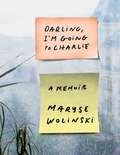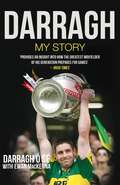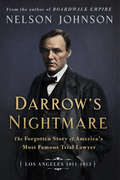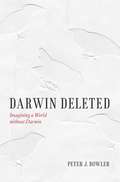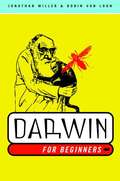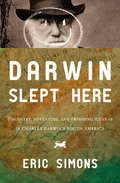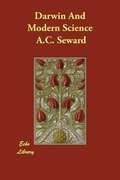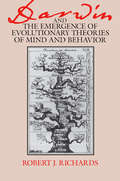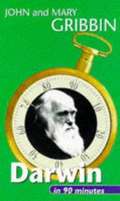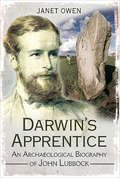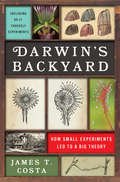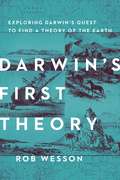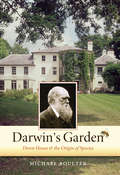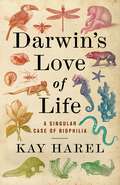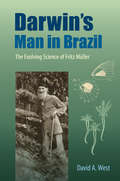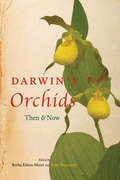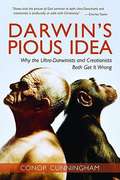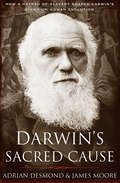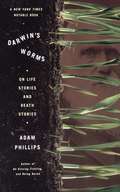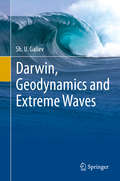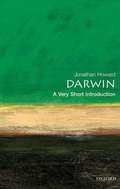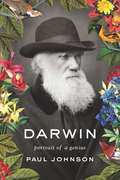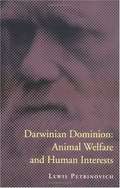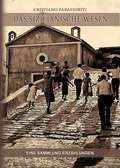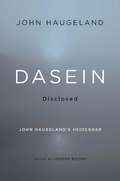- Table View
- List View
Darling, I'm Going to Charlie: A Memoir
by Maryse WolinskiAn elegant, deeply felt memoir from Maryse Wolinski—journalist and widow of the late cartoonist Georges Wolinski, who died in the terrorist attack on the French satirical magazine Charlie Hebdo—that is both a beautiful tribute to her late husband and a rallying call to action.“Darling, I’m going to Charlie.” These were the last words that prolific satirical cartoonist Georges Wolinski said to his wife, Maryse, as he left for work. Two hours later, terrorists barged into the Paris offices of the Charlie Hebdo magazine, fatally shooting him and eleven others. Maryse remembers her marriage to Georges—forty-seven years of love and devotion—and the swift, cruel manner in which she lost him. From her grief comes a demand for answers as she investigates the failings of the French government in their security measures, especially when another terrorist attack occurs just eight months later. A celebrated journalist in her own right, Maryse writes with both clarity and authority, all the while exploring what made her relationship with Georges so singularly strong. Darling, I’m Going to Charlie is not only one woman’s beautiful tribute to her late husband, but also a stunning, courageous testimony and inspiring call for change.
Darragh: My Story
by Darragh Ó SéFor 16 years, Darragh Ó Sé wore the number 8 jersey for Gaelic football's most celebrated county, stoking the fires in Kerry's engine room. With six All Ireland medals, he is the most decorated footballer of the modern era.Darragh's name is synonymous with his county's unrelenting appetite for success, but throughout his illustrious career he has held his counsel, allowing his football to do the talking. Until now.This is the story of a modern Kerry icon. Uncompromising, passionate and possessing a savage wit, Darragh talks openly for the first time about his life in the green and gold, and about his constant drive to succeed.Elsewhere in the book, he details his setbacks, reflects on a family tragedy and reveals how his upbringing on the fringe of west Kerry helped shape his character, steeling him for a career in the toughest position in Gaelic football. This is the story of Darragh Ó Sé - the life of a legend.
Darrow's Nightmare: The Forgotten Story of America's Most Famous Trial Lawyer (Los Angeles 1911–1913)
by Nelson Johnson&“A fascinating portrait of Clarence Darrow as we&’ve never seen him before&” from the author of the bestselling book and hit HBO series Boardwalk Empire (Terence Winter, creator & executive producer, Boardwalk Empire). Clarence Darrow is the most celebrated criminal trial lawyer in American history. In the Spring of 1911, organized labor implored Darrow to represent the McNamara brothers, two union iron workers charged with the murder of twenty employees arising out of the bombing of the Los Angeles Times building. Darrow and his wife Ruby&’s trip west quickly became a fight for survival. After Darrow negotiated a plea bargain for the McNamaras with the help of the brilliant journalist Lincoln Steffens, Darrow was indicted for attempted bribery of a juror. But for the representation of a charismatic, flamboyant, and troubled genius, California criminal attorney Earl Rogers, Darrow&’s career might have ended that year in Los Angeles. The two trials were front-page national news in their day, and then lost to history. Nelson Johnson has brought this two-year episode to life with a cast of memorable characters based upon his study of the 8,500-plus page trial transcript plus many published and unpublished sources (including Ruby&’s letters to Darrow&’s biographer Irving Stone).Darrow&’s Nightmare is a true story unlike any other—a historical courtroom thriller brought to life.
Darwin Deleted: Imagining a World without Darwin
by Peter J. BowlerThe ideas and terminology of Darwinism are so pervasive these days that it seems impossible to avoid them, let alone imagine a world without them. But in this remarkable rethinking of scientific history, Peter J. Bowler does just that. He asks: aWhat if Charles Darwin had not returned from the voyage of the "Beagle" and thus did not write "On the Origin of Species"? Would someone else, such as Alfred Russel Wallace, have published the selection theory and initiated a similar transformation? Or would the absence of DarwinOCOs book have led to a different sequence of events, in which biology developed along a track that did not precipitate a great debate about the impact of evolutionism? Would there have been anything equivalent to social Darwinism, and if so would the alternatives have been less pernicious and misappropriated?In" Darwin Deleted," Bowler argues that no one else, not even Wallace, was in a position to duplicate DarwinOCOs complete theory of evolution by natural selection. aEvolutionary biology would almost certainly have emerged, but through alternative theories, which were frequently promoted by scientists, religious thinkers, and moralists who feared the implications of natural selection. Because non-Darwinian elements of evolutionism flourished for a time in the real world, it is possible to plausibly imagine how they might have developed, particularly if the theory of natural selection had not emerged until decades after the acceptance of the basic idea of evolution. BowlerOCOs unique approach enables him to clearly explain the non-Darwinian traditionOCoand in doing so, he reveals how the reception of Darwinism was historically contingent. By taking Darwin out of the equation, Bowler is able to fully elucidate the ideas of other scientists, such as Richard Owen and Thomas Huxley, whose work has often been misunderstood because of their distinctive responses to Darwin. "Darwin Deleted" boldly offers a new vision of scientific history. It is one where the sequence of discovery and development would have been very different and would have led to an alternative understanding of the relationship between evolution, heredity, and the environmentOCoand, most significantly, a less contentious relationship between science and religion. Far from mere speculation, this fascinating and compelling book forces us to reexamine the preconceptions that underlie many of the current controversies about the impact of evolutionism. It shows how contingent circumstances surrounding the publication of "On the Origin of Species" polarized attitudes in ways that still shape the conversation today. a
Darwin For Beginners
by Borin Van Loon Jonathan MillerTaking us through the upheavals in biological thought which made The Origins of Species possible, Jonathan Miller introduces us to that odd revolutionary, Charles Darwin -- a remarkably timid man who spent most of his life in seclusion; a semi-invalid riddled with doubts, fearing the controversy his theories might unleash; yet also the man who finally undermined belief in God's creation. Along the way we meet a fascinating cast of characters: Darwin's scientific predecessors, his contemporaries (including Alfred Russell Wallace, whose anticipation of natural selection forced Darwin to publish), his opponents, and his successors whose work in modern genetics provided necessary modifications to Darwin's own work. Splendidly illustrated, this clever, witty, highly informative book is the perfect introduction to Darwin's life and thought.
Darwin Slept Here: Discovery, Adventure, and Swimming Iguanas in Charles Darwin's South America
by Eric SimonsThis entertaining combination of history, biography, and travel adventure is &“a bracingly fresh portrait [of] Darwin . . . Nothing less than exhilarating&” (Michael Pollan, New York Times–bestselling author of The Omnivore&’s Dilemma). One snowy day in Ushuaia, Argentina, Eric Simons picked up a copy of Charles Darwin&’s The Voyage of the Beagle. Simons had just hiked the mountains overlooking Beagle Channel, and found himself engrossed in Darwin&’s surprisingly relatable account. Like Simons, Darwin had been in his mid-twenties when he traveled to South America in search of adventure. Inspired, Simons went further into South America, exploring the histories, legends, and people that had fascinated Darwin himself two centuries before. In Darwin Slept Here, Simons journeys in the footsteps of one of the fathers of modern science, introducing readers to &“a refreshingly different Darwin: a twenty-something traveler fond of hurling iguanas into the sea and charging up any tall peak he could find&” (Outside Magazine). &“Hard to put Simons&’ book down—lighthearted adventures that keep a reader wanting more.&” —San Francisco Chronicle
Darwin and Modern Science
by A. C. SewardThe Cambridge Philosophical Society collected this series of essays in commemoration of the centenary of the birth of Charles Darwin and the 50th anniversary of the publication of The Origin of Species. Aiming to be accessible to the 'educated layman', the eminent contributors reviewed the impact of Darwin's ideas in many spheres. They addressed contemporary (1909) attitudes, Darwin's theories and their far-reaching implications, and the progress of new lines of research that had emerged from them. The diversity of views among biologists regarding both the origin of species and the best directions for further research is clearly evident. In his work, Darwin had sought only the truth, writing 'Absolute accuracy is the hardest merit to attain, and the highest merit. Any deviation is ruin.' However dramatic the controversies he stirred, what shines from these essays is profound admiration for both Darwin's intellect and the quality of his character.
Darwin and the Emergence of Evolutionary Theories of Mind and Behavior
by Robert J. Richards edited by David L. HullWith insight and wit, Robert J. Richards focuses on the development of evolutionary theories of mind and behavior from their first distinct appearance in the eighteenth century to their controversial state today. Particularly important in the nineteenth century were Charles Darwin's ideas about instinct, reason, and morality, which Richards considers against the background of Darwin's personality, training, scientific and cultural concerns, and intellectual community. Many critics have argued that the Darwinian revolution stripped nature of moral purpose and ethically neutered the human animal. Richards contends, however, that Darwin, Herbert Spencer, and their disciples attempted to reanimate moral life, believing that the evolutionary process gave heart to unselfish, altruistic behavior. "Richards's book is now the obvious introduction to the history of ideas about mind and behavior in the nineteenth century. "—Mark Ridley, Times Literary Supplement "Not since the publication of Michael Ghiselin's The Triumph of the Darwinian Method has there been such an ambitious, challenging, and methodologically self-conscious interpretation of the rise and development and evolutionary theories and Darwin's role therein. "—John C. Greene, Science "His book . . . triumphantly achieves the goal of all great scholarship: it not only informs us, but shows us why becoming thus informed is essential to understanding our own issues and projects. "—Daniel C. Dennett, Philosophy of Science
Darwin in 90 Minutes
by John Gribbin Mary GribbinIn this easy-to-read series, eminent science writers John and Mary Gribbin look at the lives and work of eight major scientists. Each book is accessible enough to be read for fun but informative enough to appeal to students of science. The iconic Albert Einstein emerges as a dashing ladies' man and the greatest scientist of his time; but why did Charles Darwin wait for decades before going public with his ideas on evolution? How was Marie Curie's great work shaped by her childhood experiences of oppression under the Czars? And what was Edmond Halley, of comet fame, doing as Captain of a King's Ship and later spy for the Crown? An introduction and afterword places each scientist's work in the context of the development of their subject.
Darwin's Apprentice: An Archaeological Biography of John Lubbock
by Janet OwenThe fascinating story of Charles Darwin&’s friend, fellow scientist, and champion. Sir John Lubbock was an important Darwinist, witness to an extraordinary moment in the history of science and archaeology—the emotive scientific, religious, and philosophical debate which was triggered by the publication of Darwin&’s On the Origin of Species in 1859. Darwin&’s Apprentice looks at Lubbock&’s critical yet often overlooked role in the Darwinian campaign, including the ways in which Lubbock&’s archaeological and ethnographic collections shaped both his work and personal life. It offers an enlightening view not only of the beginnings of Darwinism, but of the scientific world of late nineteenth-century Britain.
Darwin's Backyard: How Small Experiments Led To A Big Theory
by James T. CostaDarwin’s Backyard goes beyond the portrait of Charles Darwin as a brilliant thinker to concentrate on him as a nimble experimenter delving into some of evolution’s great mysteries. James T. Costa takes readers on a journey from Darwin’s childhood through his voyage on the HMS Beagle where his ideas on evolution began. We then follow Darwin to Down House, his bustling home of forty years, where he kept porcupine quills at his desk to dissect barnacles, maintained a flock of sixteen pigeon breeds in the dovecote, and cultivated climbing plants in the study, and to Bournemouth, where on one memorable family vacation he fed carnivorous plants in the soup dishes. Using his garden and greenhouse, the surrounding meadows and woodlands, and even taking over the cellar, study, and hallways of his home-turned-field-station, Darwin tested ideas of his landmark theory of evolution with an astonishing array of hands-on experiments that could be done on the fly, without specialized equipment. He engaged naturalists, friends, neighbors, family servants, and even his children, nieces, nephews, and cousins as assistants in these experiments, which involved everything from chasing bees and tempting fish to eat seeds to serenading earthworms. From the experiments’ results, he plumbed the laws of nature and evidence for the revolutionary arguments of On the Origin of Species and his other watershed works. Beyond Darwin at work, we accompany him against the backdrop of his enduring marriage, chronic illness, grief at the loss of three children, and joy in scientific revelation. This unique glimpse of Darwin’s life introduces us to an enthusiastic correspondent, crowd-sourcer, family man, and, most of all, an incorrigible observer and experimenter. Includes directions for eighteen hands-on experiments, for home, school, yard, or garden.
Darwin's First Theory: Exploring Darwin's Quest For A Theory Of Earth
by Rob WessonAn acclaimed geologist leads the reader on an adventure through the landscape that absorbed and inspired Charles Darwin. Everybody knows—or thinks they know—Charles Darwin, the father of evolution and the man who altered the way we view our place in the world. But what most people do not know is that Darwin was on board the HMS Beagle as a geologist—on a mission to examine the land, not flora and fauna. Retracing Darwin’s footsteps in South America and beyond, geologist Rob Wesson treks across the Andes, cruises waters charted by the Beagle, hunts for fossils in Uruguay and Argentina, and explores sites of long vanished glaciers in Scotland and Wales. As he follows Darwin’s path—literally and intellectually—Wesson experiences the land as Darwin did, engages with his observations, and tackles the same questions Darwin had about our ever-changing Earth. Upon his return from his five-year journey aboard the Beagle, after examining the effects of earthquakes, tsunamis, volcanic eruptions, and more, Darwin conceived his theory of subsidence and uplift‚—his first theory. These concepts and attitudes—the vastness of time; the enormous cumulative impact of almost imperceptibly slow change; change as a constant feature of the environment—underlie Darwin’s subsequent discoveries in evolution. And this peculiar way of thinking remains vitally important today as we enter the human-dominated Anthropocene age. Expertly interweaving science and adventure, Darwin’s First Theory is a riveting and revelatory journey around the world with one of the greatest scientific minds in history.
Darwin's Garden: Down House and the Origin of Species
by Michael BoulterFive years after returning from his trip around the world, young Charles Darwin became the owner of Down House in Kent, England, where he moved his growing family, far away from the turmoil and distractions of London. He would live there for the rest of his life, and it would become the place where he began work on his masterpiece, On the Origin of Species.For almost twenty years, he used the garden around him as a laboratory. In the orchard, he conducted experiments on pollination. He built a dovecote where breeding new strains of pigeons helped him understand the intricacies of generation. On his daily walk along the sandbank, he observed how plants competed for survival. In solitude he struggled with the ideas of evolution that had haunted him since his voyage, which, in turn, gave him the courage to publish his revolutionary ideas.Bringing Darwin's garden to the present day, Boulter unfolds a shining portrait of the formation of one of England's greatest thinkers and his relationship with the place he loved, and shows how his experiments—conducted more than 150 years ago—are still revealing new proofs as we continue to search for the origins of life.
Darwin's Love of Life: A Singular Case of Biophilia
by Karen L. HarelBiophilia—the love of life—encompasses the drive to survive, a sense of kinship with all life-forms, and an instinct for beauty. In this unconventional book, Kay Harel uses biophilia as a lens to explore Charles Darwin’s life and thought in deeply original ways. In a set of interrelated essays, she considers how the love of life enabled him to see otherwise unseen evolutionary truths.Harel traces the influence of biophilia on Darwin’s views of dogs, facts, thought, emotion, and beauty, informed by little-known material from his private notebooks. She argues that much of what Darwin described, envisioned, and felt was biophilia in action. Closing the book is a profile of Darwin’s marriage to Emma Wedgwood, his first cousin, a woman gifted in music and medicine who shared her husband’s love of life.Harel’s meditative, playful, and lyrical musings draw on the tools of varied disciplines—aesthetics, astronomy, biology, evolutionary theory, history of science, philosophy, psychiatry, and more—while remaining unbounded by any particular one. Taking unexpected paths to recast a figure we thought we knew, this book offers readers a different Darwin: a man full of love, joy, awe, humility, curiosity, and a zest for living.
Darwin's Man in Brazil: The Evolving Science of Fritz Müller
by David A. WestFritz Müller (1821-1897), though not as well known as his colleague Charles Darwin, belongs in the cohort of great nineteenth-century naturalists. Recovering Müller's legacy, David A. West describes the close intellectual kinship between Müller and Darwin and details a lively correspondence that spanned seventeen years. The two scientists, despite living on separate continents, often discussed new research topics and exchanged groundbreaking ideas that unequivocally moved the field of evolutionary biology forward. Müller was unique among naturalists testing Darwin's theory of natural selection because he investigated an enormous diversity of plants and animals, corresponded with prominent scientists, and published important articles in Germany, England, the United States, and Brazil. Darwin frequently praised Müller's powers of observation and interpretation, counting him among those scientists whose opinions he valued most. Despite the importance and scope of his work, however, Müller is known for relatively few of his discoveries. West remedies this oversight, chronicling the life and work of this remarkable and overlooked man of science.
Darwin's Orchids: Then and Now
by Retha Edens-Meier Peter BernhardtFor biologists, 2009 was an epochal year: the bicentennial of Charles Darwin’s birth and the 150th anniversary of the publication of a book now known simply as The Origin of Species. But for many botanists, Darwin’s true legacy starts with the 1862 publication of another volume: On the Various Contrivances by Which British and Foreign Orchids Are Fertilised by Insects and on the Good Effects of Intercrossing, or Fertilisation of Orchids. This slim but detailed book with the improbably long title was the first in a series of plant studies by Darwin that continues to serve as a global exemplar in the field of evolutionary botany. In Darwin’s Orchids, an international group of orchid biologists unites to celebrate and explore the continuum that stretches from Darwin’s groundbreaking orchid research to that of today. Mirroring the structure of Fertilisation of Orchids, Darwin’s Orchids investigates flowers from Darwin’s home in England, through the southern hemisphere, and on to North America and China as it seeks to address a set of questions first put forward by Darwin himself: What pollinates this particular type of orchid? How does its pollination mechanism work? Will an orchid self-pollinate or is an insect or other animal vector required? And how has this orchid’s lineage changed over time? Diverse in their colors, forms, aromas, and pollination schemes, orchids have long been considered ideal models for the study of plant evolution and conservation. Looking to the past, present, and future of botany, Darwin’s Orchids will be a vital addition to this tradition.
Darwin's Pious Idea: Why the Ultra-Darwinists and Creationists Both Get It Wrong
by Conor CunninghamIn "Darwin's Pious Idea," Cunningham puts forth a compelling, cutting-edge case for both creation and evolution, drawing skillfully on an array of philosophical, theological, historical, and scientific sources to buttress his arguments.
Darwin's Sacred Cause: How a Hatred of Slavery Shaped Darwin's Views on Human Evolution
by James Moore Adrian DesmondAn &“arresting&” and deeply personal portrait that &“confront[s] the touchy subject of Darwin and race head on&” (The New York Times Book Review). It&’s difficult to overstate the profound risk Charles Darwin took in publishing his theory of evolution. How and why would a quiet, respectable gentleman, a pillar of his parish, produce one of the most radical ideas in the history of human thought? Drawing on a wealth of manuscripts, family letters, diaries, and even ships&’ logs, Adrian Desmond and James Moore have restored the moral missing link to the story of Charles Darwin&’s historic achievement. Nineteenth-century apologists for slavery argued that blacks and whites had originated as separate species, with whites created superior. Darwin, however, believed that the races belonged to the same human family. Slavery was therefore a sin, and abolishing it became Darwin&’s sacred cause. His theory of evolution gave a common ancestor not only to all races, but to all biological life. This &“masterful&” book restores the missing moral core of Darwin&’s evolutionary universe, providing a completely new account of how he came to his shattering theories about human origins (Publishers Weekly, starred review). It will revolutionize your view of the great naturalist. &“An illuminating new book.&” —Smithsonian &“Compelling . . . Desmond and Moore aptly describe Darwin&’s interaction with some of the thorniest social and political issues of the day.&” —Wired &“This exciting book is sure to create a stir.&” —Janet Browne, Aramont Professor of the History of Science, Harvard University, and author of Charles Darwin: Voyaging
Darwin's Worms: On Life Stories and Death Stories
by Adam PhillipsAdam Phillips has been called "the psychotherapist of the floating world" and "the closest thing we have to a philosopher of happiness. " His style is epigrammatic; his intelligence, electric. His new book, Darwin's Worms, uses the biographical details of Darwin's and Freud's lives to examine endings-suffering, mortality, extinction, and death. Both Freud and Darwin were interested in how destruction conserves life. They took their inspiration from fossils or from half-remembered dreams. Each told a story that has altered our perception of our lives. For Darwin, Phillips explains, "the story to tell was how species can drift towards extinction; for Freud, the story was how the individual tended to, and tended towards his own death. " In each case, it is a death story that uniquely illuminates the life story.
Darwin, Geodynamics and Extreme Waves
by Sh. U. GalievThis book examines the reasons behind the resonant amplification of seismic and ocean waves that have the capacity to destroy cities and ocean-going vessels. Using Charles Darwin's important geophysical research as a starting point, it provides insights into the interaction between earthquakes with volcanoes, seaquake, and tsunami formation. In particular, the author details the observations that Darwin made on a powerful earthquake that occurred in Chile in 1835, noting how the famous naturalist and geologist used the concept of earthquake-induced vertical shock to explain the event's devastating impact. The book then goes on to show how Darwin's concept relates to the catastrophic results of the shallow quakes that recently destroyed Port-au-Prince (Haiti, 2010) and severely damaged Christchurch (New Zealand, 2011). In addition, the author asks whether Darwin's ideas are endorsed by the discoveries of modern science and whether the results of destructive earthquakes can be modeled using strongly nonlinear wave equations. Coverage also proposes that similar equations can be used to simulate the dynamics of many objects on the surface of the Earth, and to model the origin of the Universe, dark matter, and dark energy as strongly nonlinear wave phenomena. The book will appeal to students as well as researchers and engineers in geophysics, seismology, nonlinear wave studies, cosmology, physical oceanography, and ocean and coastal engineering. It will also be of use to those who are interested in the phenomena of natural catastrophes as well as those who want to learn more about the life and work of Charles Darwin.
Darwin: A Very Short Introduction
by Jonathan HowardDarwin's theory that man's ancestors were apes caused an uproar within the scientific world, as well as public frenzy when The Origin of Species was published in 1859. Arguments still rage about the implications of his evolutionary theory, and skepticism about the value of Darwin's contribution to knowledge is widespread. In this analysis of Darwin's major insights and arguments, Jonathan Howard reasserts the importance of Darwin's work for the development of modern biology. He offers a stimulating view of the famous scientist in a concise, handy format, making it a masterpiece for all Darwinians as well as for all general readers of popular science.
Darwin: portrait of a genius
by Paul JohnsonEminent historian Paul Johnson provides a rich, succinct portrait of Charles Darwin Charles Darwin is arguably the most influential scientist of all time. His Origin of Species forever changed our concept of the world’s creation. Darwin’s revolutionary career is the perfect vehicle for historian Paul Johnson. Marked by the insightful observation, spectacular wit, and highly readable prose for which Johnson is so well regarded, Darwin brings the gentleman-scientist and his times brilliantly into focus. From Darwin’s birth into great fortune to his voyage aboard the Beagle, to the long-delayed publication of his masterpiece, Johnson delves into what made this Victorian gentleman into a visionary scientist—and into the tragic flaws that later led Darwin to support the burgeoning eugenics movement. Johnson’s many admirers as well as history and science buffs will be grateful for this superb account of Darwin and the everlasting impact of his discoveries. .
Darwinian Dominion: Animal Welfare and Human Interests
by Lewis PetrinovichThe controversial subject of this book is the permissible use of animals by humans. Lewis Petrinovich argues that humans have a set of cognitive abilities, developing from a suite of emotional attachments, that make them unique among species.
Das sizilianische Wesen
by Cristiano ParafioritiNach den Erzählungen in “Mein Dorf, meine Leute” (2014) veröffentlicht Cristiano Parafioriti weitere Geschichten über Galati Mamertino, sein Heimatdorf in Sizilien. Neue Personen, neue Umstände, neue Emotionen entspringen der Vielfalt des Herzens und rufen schlummernde Farben und Gefühle wach. Das sizilianische Wesen ist zwischen den Zeilen jeder Geschichte spürbar und tritt nach und nach immer stärker in den Vordergrund, sodass der Leser in eine ferne, melancholische, aber auch heißblütige und echte Welt eingetaucht wird. Zeit ist nur ein Begriff, Augenblicke von gestern und heute werden miteinander verknüpft und beschwören die Erinnerung und die Liebe für diese Insel und ihre Bevölkerung herauf. Je weiter man liest, desto mehr spürt man die untrennbare Verbindung des Autors mit seiner Geburtsinsel und noch mehr mit seinem Dorf. Eine beinahe angeborene Liebe, die den Autor stets umklammert, sodass zwischen den durch die Erinnerung schweifenden Zeilen die Sehnsucht nach dem sizilianischen Wesen durchschimmert.
Dasein Disclosed
by John Haugeland Joseph RouseAt his death in 2010, the Anglo-American analytic philosopher John Haugeland left an unfinished manuscript summarizing his life-long engagement with Heidegger’s Being and Time. As illuminating as it is iconoclastic, Dasein Disclosed is not just Haugeland’s Heidegger-this sweeping reevaluation is a major contribution to philosophy in its own right.
